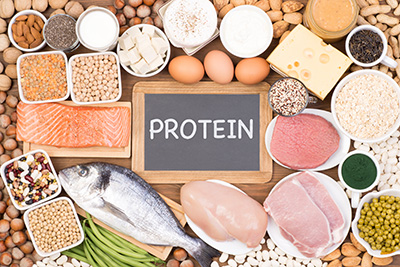Menu
Working Hours: 08:30 am - 05:00 pm

When you power through a tough workout, your muscles probably feel tight, sore, and in need of some serious TLC. The soreness is a reminder of your hard work, but it’s also your body’s way of telling you it needs help to recover. While rest is an important part of recovery, your diet is just as important. Protein plays a starring role in helping your muscles bounce back and grow stronger. Right Weight Center is here to help you understand how critical nutrition is to achieving your fitness and wellness goals. Keep reading to learn why protein should be a priority in your meals.
Every time you work out, you challenge your muscles and push them to their limits. This stress causes microscopic tears in your muscle fibers, especially during resistance training or high-impact activities. While it may sound like a bad thing, these tears are actually what lead to muscle growth and increased strength. The catch is that they need to heal first, and protein is designed to help you do that. Proteins are made up of amino acids, which are the building blocks your body uses to repair and rebuild muscle tissue. Without enough protein, the repair process is slowed down, and it can leave you with lingering soreness and a stall in progress. Eating enough protein will make sure your muscles can rebuild efficiently so you’re ready to tackle your next workout.
For muscles to grow, your body needs to create new muscle fibers in a process called muscle protein synthesis. This happens when your body takes the amino acids from the protein you eat and uses them to build new tissue. Without enough protein in your diet, your body simply doesn’t have the tools it needs to grow muscle effectively. After a workout, your body is in a state where muscle breakdown is occurring at a faster rate than muscle building. Consuming protein after exercise can shift the balance in favor of muscle growth. This is why fitness experts recommend eating a protein-rich meal or snack within 30 to 60 minutes after your workout. This anabolic window is the perfect time for your body to maximize the benefits of the protein you consume. It’s also worth noting that as we age, our bodies become less efficient at building and maintaining muscle, which makes protein intake even more critical. Whether you’re 20 or 50, prioritizing protein can help you preserve and grow lean muscle mass, which is central to staying strong and healthy over time.
The general recommendation for sedentary adults is about 0.36 grams of protein per pound of body weight, but active individuals who are focusing on muscle building or recovery require much more. For most people engaging in regular exercise, aiming for 0.8 to 1.2 grams of protein per pound of body weight is a good guideline. Timing matters, too. Spreading your protein intake throughout the day will make sure your body has a steady supply of amino acids to fuel recovery and growth. This approach is more effective than consuming a large amount of protein in one sitting. If you’re unsure about your specific needs, speak with a professional weight loss doctor in District Heights, MD or nutrition expert who can help you create a plan that will fit your goals.
Protein is also incredibly beneficial for weight management. In fact, increasing your protein intake can help with weight loss management in several ways:
While protein supplements like shakes and powders are convenient, whole food sources should be your primary go-to. These foods provide high-quality protein and come with additional nutrients your body needs for overall health. Some of the best protein sources include:
For those focused on medical weight loss, leaner protein options like skinless poultry, fish, and low-fat dairy are ideal. Plant-based proteins can also be effective, especially when combined, to ensure all essential amino acids are covered.
Whether you’re working to build muscle, improve your fitness, or lose weight, making protein a priority can transform your results. At Right Weight Center, we believe in a holistic approach to health and fitness. Whether you need guidance on creating a protein-rich meal plan, support from a weight loss doctor, or help with medical weight loss, our team is here to help you succeed. If you’re ready to take the next step, contact our office and schedule a consultation with a weight loss management specialist
See what our patients have to say... You don't have to pay thousands of dollars to lose weight. Our patients have great inspiring stories from a experience with us.